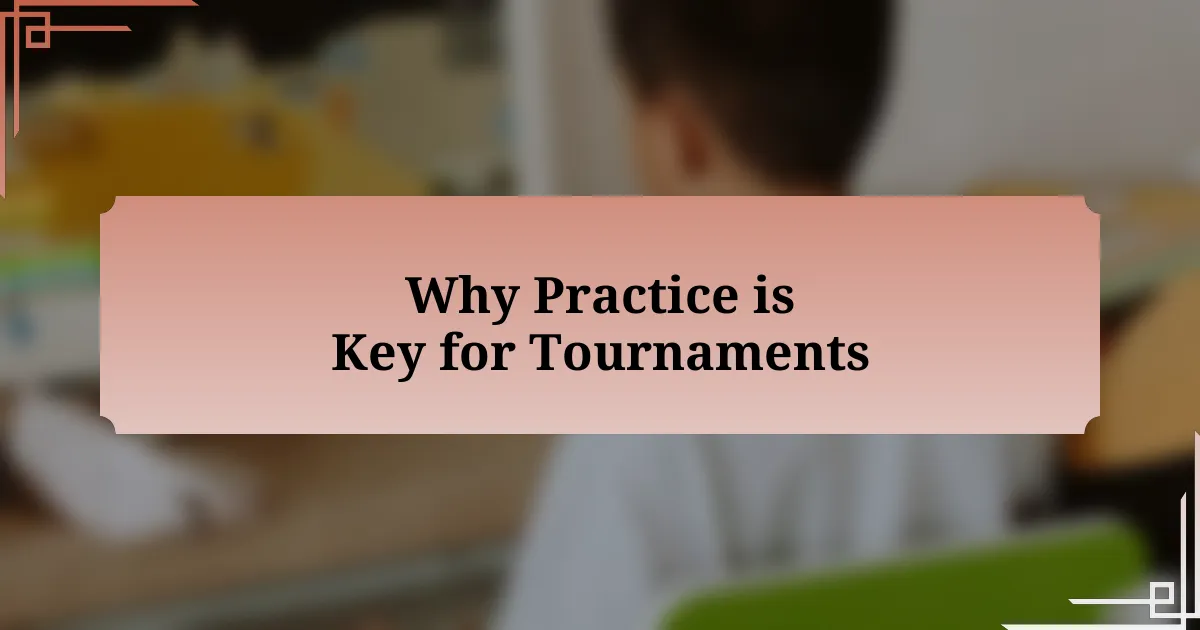Key takeaways:
- Understanding eSports requires a blend of strategy, teamwork, communication, and psychological resilience.
- Regular practice is essential for skill development, teamwork, discipline, and mental resilience in high-pressure situations.
- Setting clear goals and tracking progress are crucial for motivation and improvement in eSports performance.
- Incorporating feedback and reflective practices enhances gameplay and prepares players effectively for tournaments.
Author: Evelyn Hartley
Bio: Evelyn Hartley is an award-winning author known for her compelling narratives and richly drawn characters. With a background in psychology and literature, she weaves intricate tales that explore the complexities of human relationships and the intricacies of the human psyche. Her debut novel, “Whispers in the Dark,” was celebrated by critics and readers alike, earning her a dedicated following. Evelyn’s work has been featured in various literary journals and anthologies, and she frequently speaks at writing conferences and workshops. When she’s not writing, she enjoys hiking in the mountains and volunteering at her local animal shelter. She resides in Seattle with her two rescue dogs, Luna and Milo.
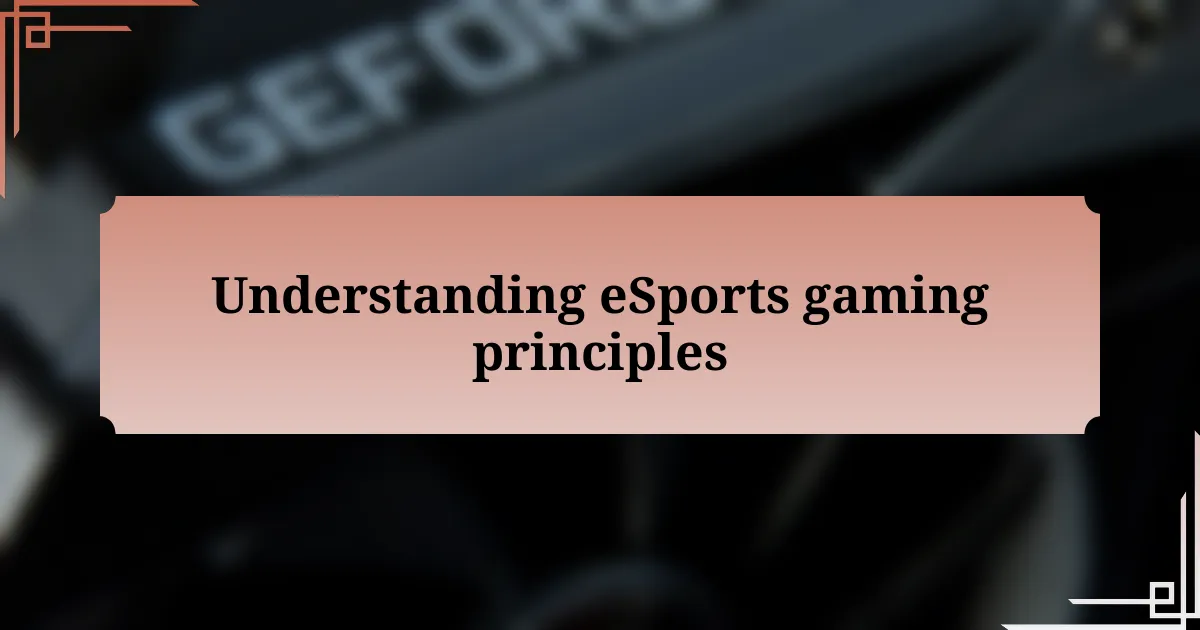
Understanding eSports gaming principles
To truly grasp eSports gaming principles, one must appreciate the blend of strategy, teamwork, and communication that defines the competitive environment. I remember a time when I was deep into a team-based match where every player’s role was crucial. The moment someone made a misstep, it was not just a personal loss; it felt like a blow to the entire team’s morale. Isn’t it interesting how a single action can ripple through a group, impacting everyone’s performance?
Moreover, understanding the mechanics of the game is fundamental. Each character or champion has unique abilities that can turn the tide of battle, and mastering these nuances requires dedication. I often reflect on the hours I spent experimenting with different strategies and characters before a tournament. It taught me that cognitive flexibility—the ability to adapt to changing circumstances—is just as vital as mechanical skill. Have you ever thought about how much of a difference that adaptability can make in a high-pressure situation?
Finally, it’s essential to recognize the psychological aspects that play a huge role in eSports. Stress management can be the difference between victory and defeat when the stakes are high. I’ve faced nerves that threatened to unhinge my focus, and learning to turn that anxiety into fuel was a pivotal moment in my journey. How do you prepare your mind for the challenges ahead? Sharing these insights can help foster a deeper understanding of what it truly takes to succeed in eSports.

Importance of practice in eSports
When it comes to eSports, practice isn’t just essential—it’s the bedrock of success. Think back to those long, grueling hours I spent grinding in training. Each session felt like a small battle where I honed my skills and developed muscle memory. That repetition reinforced my ability to execute complex moves under pressure, transforming hesitation into confidence. Have you ever found yourself in a match where everything just clicked? That seamless flow often comes from the countless hours of practice behind the scenes.
One significant aspect of practice in eSports is the opportunity to analyze gameplay. After each practice session, my team and I would review our recorded matches, dissecting every decision and movement. This reflective process allowed us to identify weaknesses and strengths alike. I vividly remember a game where my positioning cost us the match. By talking it over as a team, we turned that mistake into a learning experience, improving our synergy for future competitions. How often do you revisit your play to understand what worked and what didn’t?
Furthermore, practice serves as a powerful tool for mental resilience. I once faced a particularly intense losing streak before a big tournament. It was demoralizing, to say the least. But instead of giving up, I chose to double down on my practice. Each failure fueled my determination, leading to breakthroughs that ultimately sharpened my focus during crucial moments. Isn’t it fascinating how pushing through those difficult times can lead not just to improved skills, but also to a stronger mindset?
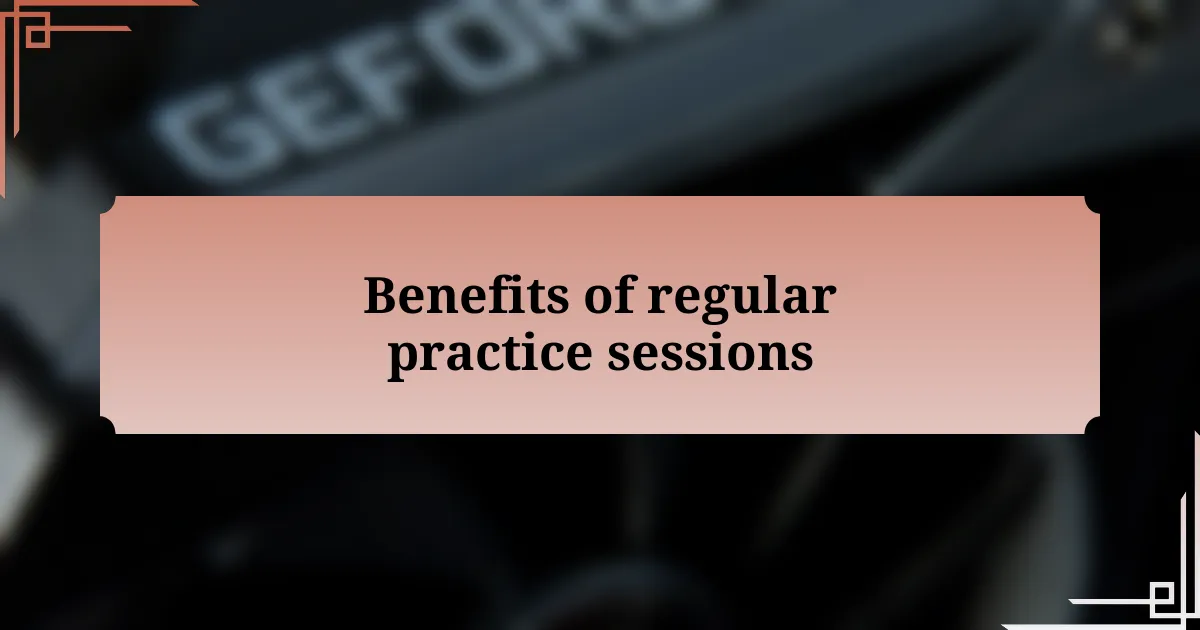
Benefits of regular practice sessions
Regular practice sessions are a cornerstone for building teamwork and communication among players. I recall a time when my teammates and I were struggling to coordinate our strategies during matches. It wasn’t until we dedicated time to practice together that we learned to communicate seamlessly. Those regular sessions taught us how to anticipate each other’s moves, turning us from a group of individuals into a cohesive unit. Have you ever experienced the magic of a perfectly executed team strategy? It’s exhilarating!
Moreover, I can’t emphasize enough how practice helps to refine individual skills and adaptability. There was a phase when I experimented with different playstyles, trying to find my sweet spot in the team. By consistently practicing, I could explore and adapt to various strategies without the pressure of a live tournament. This experimentation not only improved my gameplay but also made me more versatile. Don’t you think being multi-faceted in a game can give you an edge over opponents who rely on a single approach?
Another significant benefit is the development of discipline and routine. Establishing a consistent practice schedule transformed my gaming habits. I remember feeling so much more organized, knowing that I had specific goals for each session. The discipline I cultivated in those hours translated into my performance, especially during high-stakes matches. How often do we underestimate how routine can enhance overall effectiveness? Finding that rhythm can truly elevate your game.
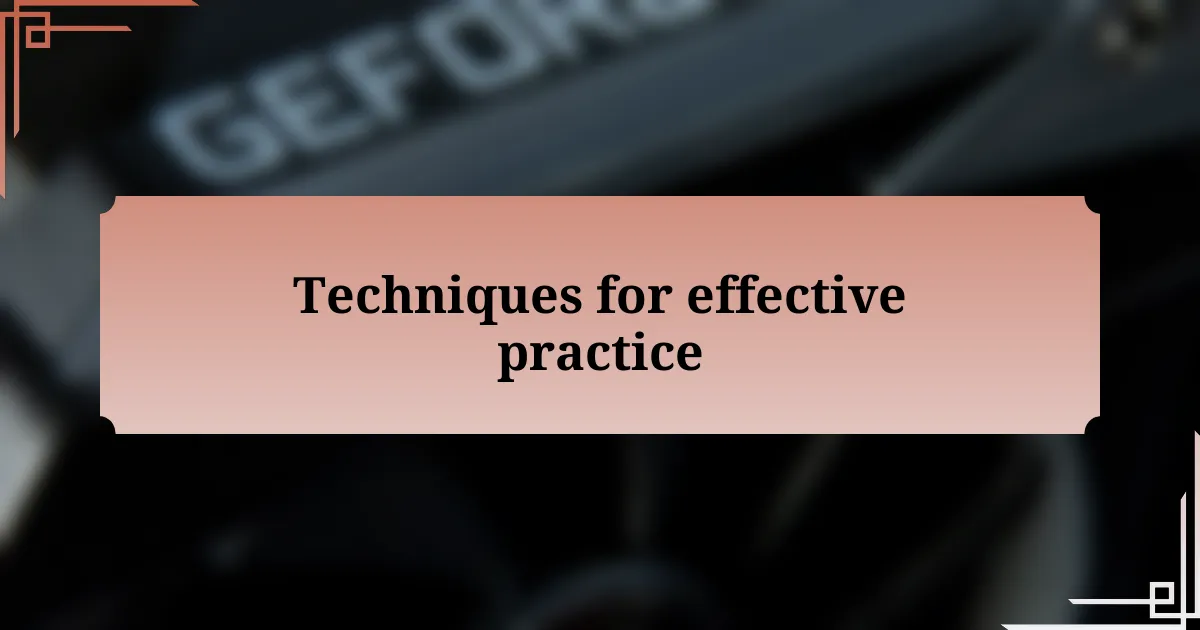
Techniques for effective practice
Focusing on specific skills during practice sessions can create significant improvements in gameplay. I made a habit of dedicating certain days to sharpening particular techniques, like my aiming or map knowledge. It was fascinating to see the instant impact these focused sessions had during tournaments, making me feel more prepared and confident. Have you ever noticed how just a few hours of targeted practice can transform your performance?
Incorporating practice scenarios that mimic tournament conditions is another strategy I’ve found to be priceless. For instance, setting up custom matches with my team under strict time limits helped us get accustomed to the pressure we’d face in real competitions. This approach not only honed our decision-making under stress but also solidified our communication during high-pressure moments. Isn’t it comforting to train for the heat of battle?
Lastly, reviewing recorded gameplay became an invaluable part of my practice routines. Analyzing my own matches revealed patterns I had overlooked in the heat of the moment—like my tendency to overcommit or my lack of map awareness. This reflective practice allowed me to identify weak points and adjust my strategies for future games. Doesn’t it often feel easier to learn from our past mistakes when we see them in action?
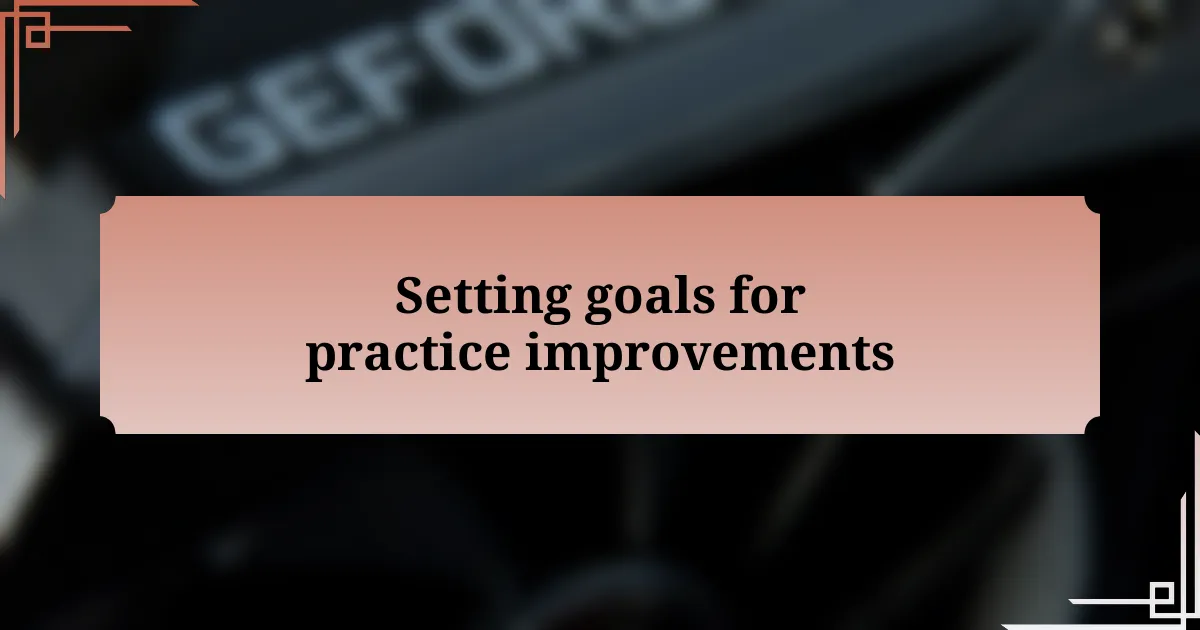
Setting goals for practice improvements
Setting clear and achievable goals for practice can drastically improve your performance in tournaments. From my experience, breaking down larger objectives into smaller, manageable tasks keeps motivation high. For example, I aimed to double my accuracy percentage over a month through specific drills. Have you ever felt that rush when you hit a target you set for yourself?
Tracking your progress is equally important. I’ve learned that keeping a record of my scores and improvements helps me stay focused on my goals. There were times when I felt discouraged, but looking back at my growth reminded me of the hard work I put in. Isn’t it amazing how a simple chart can reignite your drive when the going gets tough?
Additionally, sharing your goals with teammates can create a supportive atmosphere and accountability. In one of my teams, we set practice benchmarks together for the week. Knowing that I had others depending on me pushed me to show up consistently. Hasn’t that sense of community motivated you in your own journey?
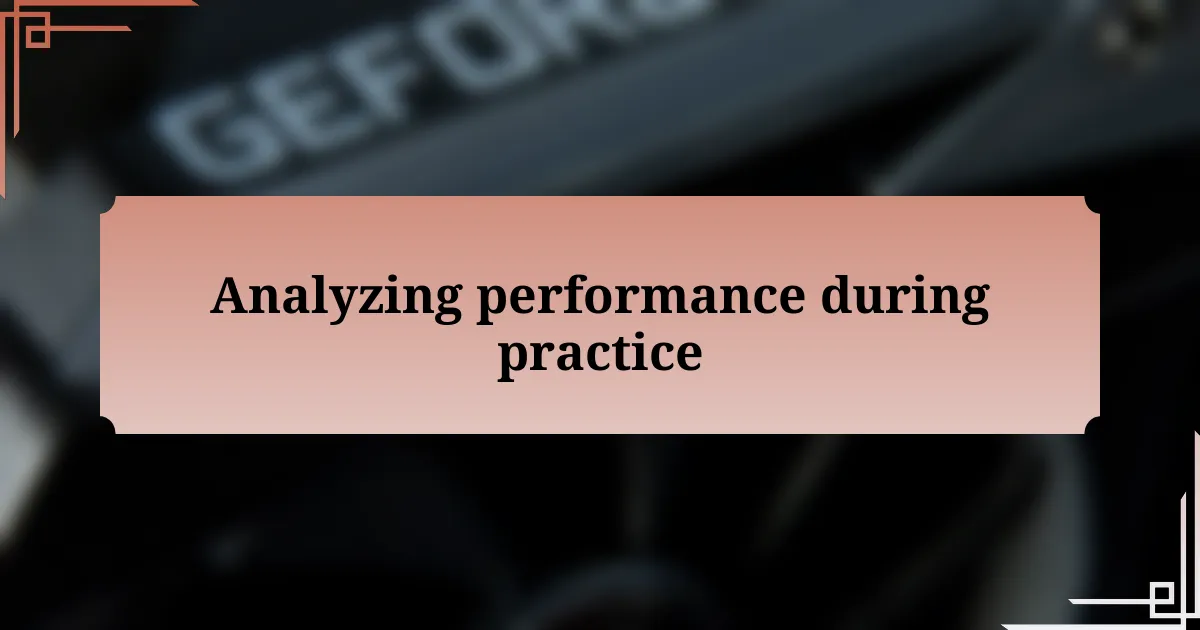
Analyzing performance during practice
When analyzing performance during practice, it’s crucial to adopt a mindset of curiosity and openness. I remember the first time I filmed my practice sessions. Watching the footage was eye-opening. I noticed habits I had formed that were hindering my gameplay, which I couldn’t see in the heat of the moment. Have you ever caught yourself making the same mistake repeatedly without realizing it?
Furthermore, breaking down each session into key metrics can enhance self-awareness. For instance, I focused on metrics like reaction time and decision-making speed. It was surprising how much I could improve by simply being aware of where I fell short. Each practice became a chance to refine specific skills, turning weaknesses into strengths. Can you imagine the satisfaction of seeing your numbers steadily climb?
Reflection after each practice session is a game-changer as well. I always kept a journal to jot down my thoughts on what went well and what didn’t. This not only helped me recall my progress but also emotionally connected me to my journey. There were moments when I felt immense pride in how far I’d come, and other times, frustration when things didn’t click. Still, this reflective practice made every session count. How do you keep track of your learning during practice?
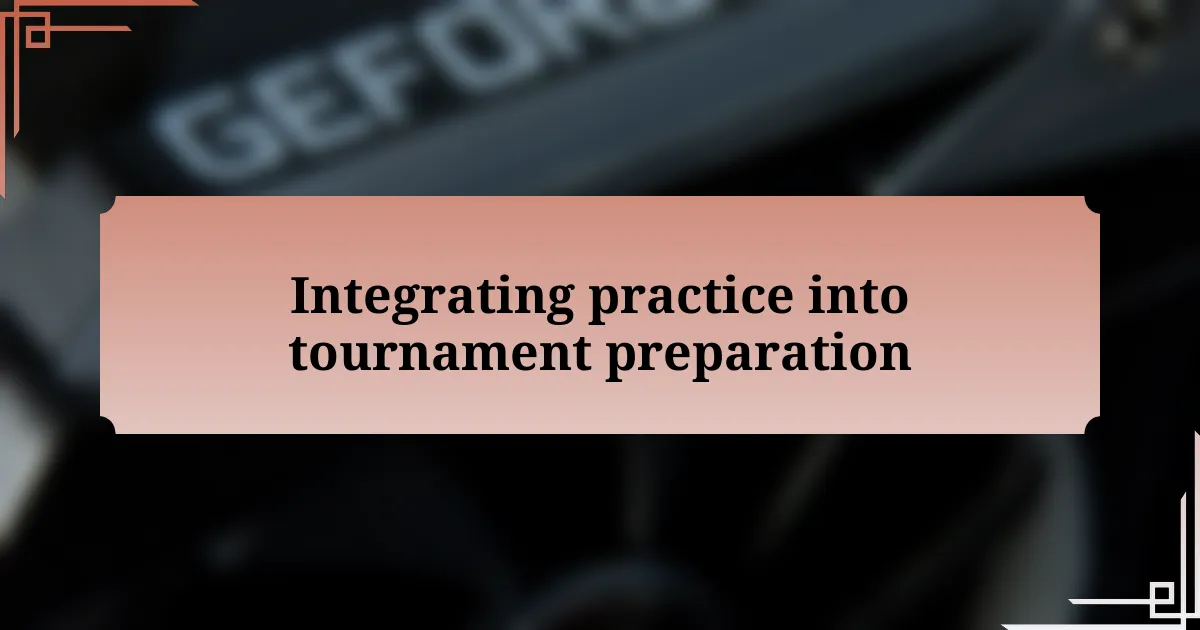
Integrating practice into tournament preparation
Integrating consistent practice into tournament preparation is essential for building muscle memory and refining strategies. I recall preparing for a major tournament where I implemented a structured practice schedule. This approach not only helped me focus on my strengths but also forced me to address my weaknesses head-on. Have you ever felt overwhelmed by the amount of gameplay to cover? I certainly did, but breaking it down made it manageable and effective.
During those training sessions, I often simulated tournament-like conditions, such as creating a high-pressure environment. It was fascinating how replicating actual tournament stress helped me adapt my gameplay. I vividly remember a time when I faced a teammate who always pushed me to my limits; those mock battles taught me more than any casual match could. Isn’t it interesting how immersing yourself in a realistic setting can bring out skills you didn’t know you had?
Incorporating feedback from my peers was another game-changer. I often invited fellow competitors to review my gameplay, which revealed blind spots I hadn’t considered. One of my teammates pointed out tactical timing issues that transformed my approach. Reflecting on their insights and adjusting accordingly defined my preparation. Have you ever had anyone give you feedback that made a significant difference? I know I have, and it truly elevated my tournament readiness.

